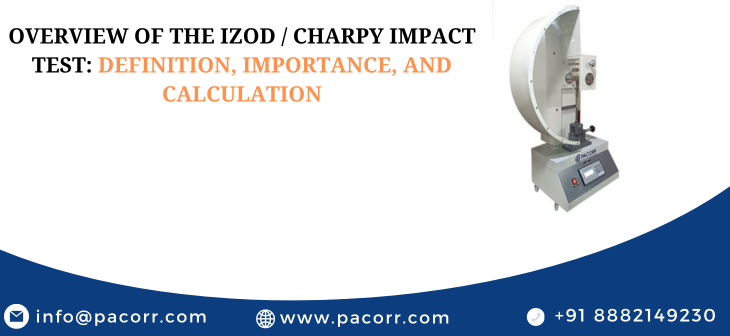
The Izod / Charpy Impact Test represents a pivotal evaluation method in the material science industry, serving as a fundamental measure of a material's toughness and resistance to impact at varying temperatures. This testing methodology is critical for assessing the durability of plastics, metals, and ceramics under sudden stresses. Administered using precise instruments such as the Izod impact tester and Charpy impact tester, these tests adhere to rigorous standards such as ASTM D256-10 and ASTM E691-14 to ensure consistent and reliable results. In this comprehensive guide, we will explore the intricacies of the Izod / Charpy impact test, underscore its significance in modern engineering applications, and detail the calculation methods used in this testing procedure.
1. What is the Izod / Charpy Impact Test?
The Izod / Charpy Impact Test measures the amount of energy absorbed by a material during fracture. This test is conducted by striking a standard-sized specimen with a hammer released from a specific height and position. The primary difference between the Izod and Charpy methods lies in the positioning of the sample. The Izod test involves a vertically positioned sample with the notch facing the hammer, whereas in the Charpy test, the sample is placed horizontally.
2. Standards Governing the Impact Tests
To maintain accuracy and reproducibility, several ASTM standards are employed:
- ASTM D256-10: This standard specifically addresses the determination of the impact resistance of plastic materials using the Izod pendulum-type impact tester.
- ASTM D618-13: Provides the standard practice for conditioning plastics for testing.
- ASTM D883-12: Offers terminology relating to plastics.
- ASTM D1248-12: Details the specifications for polyethylene plastics molding and extrusion materials.
- ASTM E691-14: Focuses on conducting an interlaboratory study to determine the precision of test methods for materials.
These standards ensure that materials are prepared, tested, and evaluated consistently to produce reliable and comparable data across different laboratories and industries.
3. Importance of the Izod / Charpy Impact Test
Impact testing is crucial in sectors where materials are expected to withstand high dynamic loads or abrupt impacts. Industries such as automotive, aerospace, construction, and sports equipment heavily rely on these tests to predict the behavior of materials under real-world conditions. For instance, in the automotive industry, understanding the impact resistance of materials can lead to better safety features and overall vehicle performance.
4. Calculation of Impact Energy
The energy absorbed by the specimen during an impact test is calculated by measuring the difference in the height of the hammer's swing before and after the impact. The formula used is:
Energy Absorbed = Potential Energy Initial − Potential Energy Final = mgh1 - mgh2
Where:
- m = mass of the hammer
- g = acceleration due to gravity
- h1 and h2 = heights of the hammer before and after impact respectively.
5. Using the Izod / Charpy Impact Tester by Pacorr
Pacorr, a leading manufacturer and supplier of testing instruments, offers robust solutions for conducting the Izod / Charpy Impact Test. The Izod / Charpy Impact Tester provided by Pacorr is designed to deliver precise and reliable results, adhering to the ASTM standards mentioned above. The tester is equipped with features that ensure ease of use and consistent data for materials testing.
6. Case Studies and Applications
Several case studies illustrate the efficacy of the Izod / Charpy Impact Test in determining product safety and design efficacy. For example, in the field of plastics, manufacturers can optimize the composition and treatment of materials to enhance their impact resistance, as evidenced by repeated testing under varied conditions.
The Izod / Charpy Impact Test is indispensable in the characterization of materials, ensuring that they meet the required safety and quality standards. With the backing of ASTM standards and the advanced testing solutions provided by companies like Pacorr, industries can continue to innovate and improve the durability and performance of their products.

